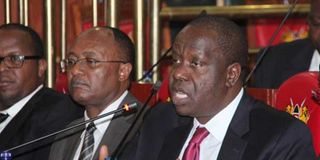Land question still a ticking time bomb

Acting Lands Cabinet Secretary Fred Matiang'i (right) and Principal Secretary, Ministry of Information, Communications and Technology Joseph Tiampati (centre) when they appeared before a parliamentary committee on May 6, 2015 on the status of proposed legislation ahead of the constitutional deadline of August 27 to pass critical laws. FILE PHOTO | JEFF ANGOTE |
What you need to know:
- Land reform is critical for the stability of the nation as well as for its economic growth.
- But the casualness with which legislators approach the matter indicates that they have learned nothing from past land conflicts.
When President Obama boards Air Force One on Sunday evening, the government and its citizens must quickly return to the task of nation building, hopefully invigorated by the example and commitment of its esteemed visitor.
A full in-tray awaits the Cabinet to meet the constitutional deadline of August 27 to pass critical laws, particularly in the area of land.
Three land laws were earlier passed in a flawed, sloppy, rushed and incoherent manner and now the Community Land Bill is about to get similar mistreatment.
CASUAL APPROACH
Land reform is critical for the stability of the nation as well as for its economic growth. However, the casualness with which legislators approach the matter indicates that they have learned nothing from past land conflicts and care less about the future of Kenya.
Mr Obama’s stated purpose in visiting was for an investment conference but there can be no sustainable and productive development without land reform that is equitable and transformative as expressed in the national land policy.
In the words of researcher Ambreena Manji, land reform has become land law reform and nothing of substance has taken place in the past five years to address the past injustices or to prevent the land grabbing phenomenon from continuing until there is nothing left to pilfer.
GIVE BACK
Community land as described in the Constitution was not just a fancy name for the former trust land. The whole intention was to give back ownership, titles, management and dispute resolution powers to the communities since the bureaucratic and political sectors had failed miserably and dishonestly to protect the public interest for decades.
In December 2012, Lands Minister James Orengo established a task force to traverse the country, consult with all interested parties and to draft a Community Land Bill. Its task was completed by February last year and they handed over the draft bill to the Commission for the Implementation of the Constitution.
Thereafter, it went to the AG, back to CS Ngilu, where it lies gathering dust as the deadline looms.
To make matters worse, two more vastly different community land Bills have been submitted for approval by Acting Lands CS Fred Matiang’i and Senator Kithure Kindiki.
Only the latter’s has been published, but only the task force one meets the requirement of Article 10 of the Constitution that demands public participation in the drafting. Put another way, both Dr Matiang’i and Prof Kindiki seem to think that reform is about new laws, and that land belongs to the government of the day anyhow. As Manji asks ‘Whose land is it anyhow?’
It would appear that it is business as usual in the land sector, confirmed by recent grabbing of Karen and Lang’ata School land. We will end up with more land laws but no justice for communities and the poor. Kenya is walking on a very dangerous path by trivialising land matters.
The National Land Commission has been starved of resources and powers and reduced to a mere department in the Lands Ministry and it doesn’t complain. Meanwhile, 99-year leases are renewed secretly and the Delamere estate has new milk producers. We are sitting or sleeping on a time bomb.
[email protected] @GabrielDolan1





